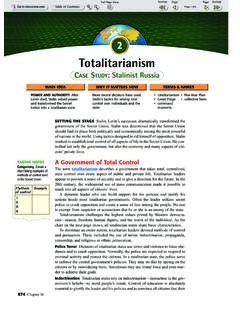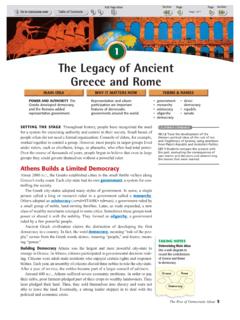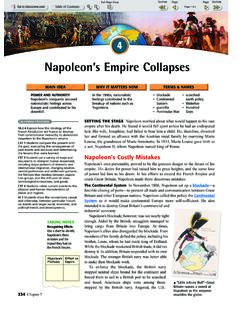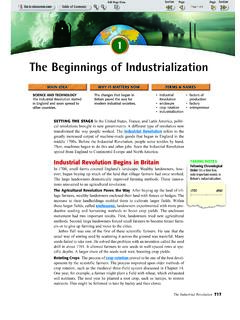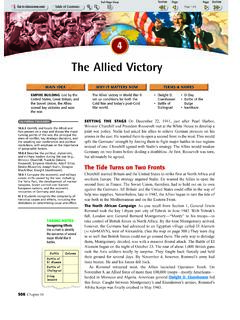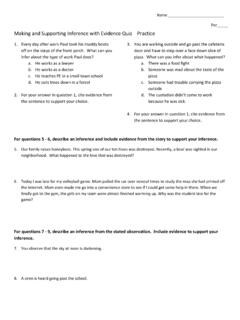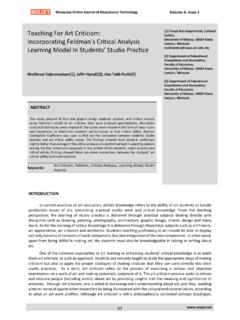Transcription of The Enlightenment in Europe - History With Mr. Green
1 MAIN IDEAWHY IT MATTERS NOWTERMS & NAMESPOWER AND AUTHORITYA revolution in intellectual activitychanged Europeans view ofgovernment and various freedoms enjoyed inmany countries today are aresult of Enlightenment thinking. Enlightenment social contract John Locke philosophe Voltaire Montesquieu Rousseau MaryWollstonecraft2 SETTING THE STAGEIn the wake of the Scientific Revolution, and the newways of thinking it prompted, scholars and philosophers began to reevaluate oldnotions about other aspects of society. They sought new insight into the underly-ing beliefs regarding government, religion, economics, and education. Theirefforts spurred the Enlightenment ,a new intellectual movement that stressedreason and thought and the power of individuals to solve problems. Known alsoas the Age of Reason, the movement reached its height in the mid-1700s andbrought great change to many aspects of Western civilization.
2 Two Views on GovernmentThe Enlightenment started from some key ideas put forth by two English politicalthinkers of the 1600s, Thomas Hobbes and John Locke. Both men experiencedthe political turmoil of England early in that century. However, they came to verydifferent conclusions about government and human s Social ContractThomas Hobbes expressed his views in a workcalled Leviathan(1651). The horrors of the English Civil War convinced him thatall humans were naturally selfish and wicked. Without governments to keeporder, Hobbes said, there would be war .. of every man against every man, and life would be solitary, poor, nasty, brutish, and short. Hobbes argued that to escape such a bleak life, people had to hand over theirrights to a strong ruler. In exchange, they gained law and order. Hobbes called thisagreement by which people created a government the social acted in their own self-interest, Hobbes said, the ruler needed total powerto keep citizens under control.
3 The best government was one that had the awesomepower of a leviathan (sea monster). In Hobbes s view, such a government was anabsolute monarchy, which could impose order and demand Enlightenment in EuropeOutlining Use an outline to organize main ideas and NOTESE nlightenment in EuropeI. Two Views onGovernmentA. The PhilosophesAdvocate Idea: The Right to GovernA monarch s rule is justified bydivine government s power comes from theconsent of the IdeaNew IdeaEnlightenment and Revolution195 CALIFORNIA the major ideas of philoso-phers and their effects on the democraticrevolutions in England, the United States,France, and Latin America ( , John Locke,Charles-Louis Montesquieu, Jean-JacquesRousseau, Sim n Bol var, Thomas Jefferson,James Madison). REP 3 Students evaluate major debatesamong historians concerning alternativeinterpretations of the past, including ananalysis of authors use of evidence and thedistinctions between sound generalizationsand misleading oversimplifications.
4 HI 2 Students recognize the complexity ofhistorical causes and effects, including thelimitations on determining cause and the use ofirony, sarcasm, orwit to attack folly,vice, or s Natural RightsThe philosopher John Lockeheld a different, morepositive, view of human nature. He believed that people could learn from experi-ence and improve themselves. As reasonable beings, they had the natural ability togovern their own affairs and to look after the welfare of society. Locke criticizedabsolute monarchy and favored the idea of self-government. According to Locke, all people are born free and equal, with three natural rights life, liberty, and property. The purpose of government, said Locke, is to protect theserights. If a government fails to do so, citizens have a right to overthrow it. Locke stheory had a deep influence on modern political thinking. His belief that a govern-ment s power comes from the consent of the people is the foundation of moderndemocracy.
5 The ideas of government by popular consent and the right to rebel againstunjust rulers helped inspire struggles for liberty in Europe and the Americas. The Philosophes Advocate ReasonThe Enlightenment reached its height in France in themid-1700s. Paris became the meeting place for people whowanted to discuss politics and ideas. The social critics ofthis period in France were known as philosophes(FIHL uh SAHFS), the French word for philosophers. Thephilosophes believed that people could apply reason to allaspects of life, just as Isaac Newton had applied reason toscience. Five concepts formed the core of their beliefs:1. ReasonEnlightened thinkers believed truth could bediscovered through reason or logical NatureThe philosophes believed that what wasnatural was also good and philosophesrejected the medievalnotion that people should find joy in the hereafter andurged people to seek well-being on ProgressThe philosophes stressed that society andhumankind could LibertyThe philosophes called for the liberties thatthe English people had won in their GloriousRevolution and Bill of Combats IntoleranceProbably the most brilliantand influential of the philosophes was Fran ois MarieArouet.
6 Using the pen name Voltaire,he published morethan 70 books of political essays, philosophy, and often used satire against his opponents. He madefrequent targets of the clergy, the aristocracy, and the govern-ment. His sharp tongue made him enemies at the Frenchcourt, and twice he was sent to prison. After his second jailterm, Voltaire was exiled to England for more than two years. Although he made powerful enemies, Voltaire neverstopped fighting for tolerance, reason, freedom of religiousbelief, and freedom of speech. He used his quill pen as if itwere a deadly weapon in a thinker s war against humanity sworst enemies intolerance, prejudice, and superstition. Hesummed up his staunch defense of liberty in one of his mostfamous quotes: I do not agree with a word you say but willdefend to the death your right to say it. ContrastingHow doesLocke s view ofhuman nature differfrom that ofHobbes?
7 196 Chapter 6 Voltaire 1694 1778 Voltaire befriended several Europeanmonarchs and nobles. Among themwas the Prussian king Frederick two men seemed like idealcompanions. Both were witty andpreferred to dress in shabby,rumpled relationship eventuallysoured, however. Voltaire dislikedediting Frederick s mediocre poetry,while Frederick suspected Voltaire ofshady business dealings. Voltaireeventually described the Prussianking as a nasty monkey, perfidiousfriend, [and] wretched poet. Frederick in turn called Voltaire a miser, dirty rogue, [and] coward. RESEARCH LINKSFor more onVoltaire, go to and the Separation of PowersAnother influential French writer,the Baron de Montesquieu(MAHN tuh SKYOO), devoted himself to the study ofpolitical liberty. Montesquieu believed that Britain was the best-governed and mostpolitically balanced country of his own day. The British king and his ministersheld executive power.
8 They carried out the laws of the state. The members ofParliament held legislative power. They made the laws. The judges of the Englishcourts held judicial power. They interpreted the laws to see how each applied to aspecific case. Montesquieu called this division of power among different branchesseparation of oversimplified the British system. It did not actually separatepowers this way. His idea, however, became a part of his most famous book, On theSpirit of Laws(1748). In his book, Montesquieu proposed that separation of pow-ers would keep any individual or group from gaining total control of the govern-ment. Power, he wrote, should be a check to power. This idea later would becalled checks and s book was admired by political leaders in the British colonies ofNorth America. His ideas about separation of powers and checks and balancesbecame the basis for the United States Constitution.
9 Rousseau: Champion of FreedomA third great philosophe, Jean JacquesRousseau(roo SOH), was passionately committed to individual freedom. The sonof a poor Swiss watchmaker, Rousseau won recognition as a writer of essays. Astrange, brilliant, and controversial figure, Rousseau strongly disagreed with otherPRIMARY SOURCEPRIMARY SOURCELaws Protect FreedomBoth Montesquieu and Rousseau believed firmly that fairand just laws not monarchs or unrestrained mobs shouldgovern society. Here, Rousseau argues that laws establishedby and for the people are the hallmark of a free Ensure SecurityWhile laws work to protect citizens from abusive rulers,Montesquieu argues that they also guard against anarchyand mob rule. DOCUMENT-BASED IssuesWhy should citizens be the authors of society s laws, accordingto Rousseau? InferencesWhy does Montesquieu believe that disobeying laws leads to aloss of liberty?I .. therefore give the name Republic to everystate that is governed by laws, no matter whatthe form of its administration may be: foronly in such a case does the public interestgovern, and the res republicarank as areality.
10 Laws are, properly speaking, only the conditions of civil association. Thepeople, being subject to the laws, ought tobe their author: the conditions of the societyought to be regulated .. by those who cometogether to form JACQUES ROUSSEAU,The Social ContractIt is true that in democracies the people seemto act as they please; but political libertydoes not consist in an unlimited .. We must have continually present toour minds the difference betweenindependence and liberty. Liberty is aright of doing whatever the laws permit,and if a citizen could do what they [thelaws] forbid he would be no longerpossessed of liberty, because all his fellow-citizens would have the same DE MONTESQUIEU,The Spirit of LawsEnlightenment and Revolution197 Analyzing IssuesWhat advan-tages didMontesquieu see inthe separation ofpowers? Enlightenment thinkers on many matters. Most philosophes believed that reason,science, and art would improve life for all people.
